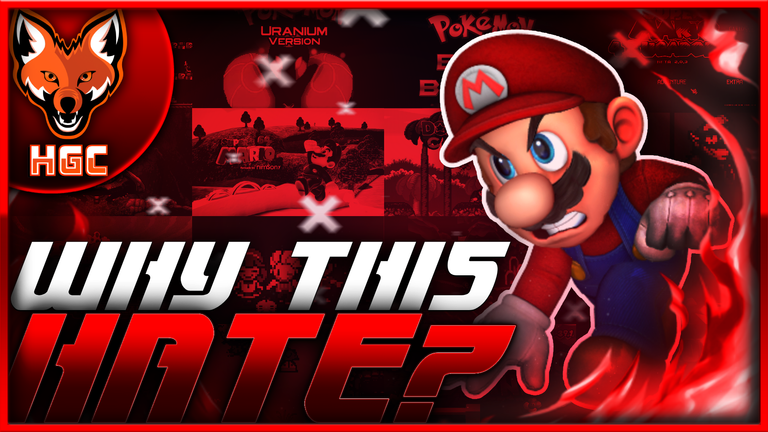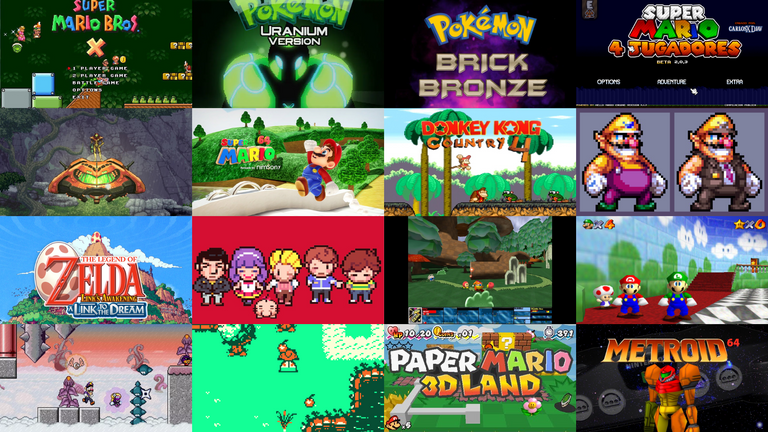Good Day, Hive friends, greetings from DigitalDicast in a new post for Hive Gaming!.
Nintendo is famous for being one of the most protective and secretive developers out there. Since they protect their IP fiercely and are usually quick to sue for any unlicensed use of their games. A good example of this is when Nintendo sues fangames, which are games based on popular franchises but made with a different game engine.
It's no secret that Nintendo doesn't like fangames. The company has been actively working to get most examples of these unlicensed uses off the Internet as much as possible. As a result, many gamers don't know why Nintendo is suing fangames or what legal problems it faces in doing so.
In this post, I will give my point of view and try to explain why Nintendo makes use of these practices in order to protect its intellectual property, so without further ado, let's start with the post!


What is a Fangame?

A fangame is a game created by fans of a certain franchise that uses copyrighted characters or game elements. The term "Fangame" is often used to describe a fan-made game based on a video game franchise such as Pokémon, Sonic the Hedgehog, Super Mario Bros, or even non-video game properties such as Death Note, Harry Potter, DC, among others.

There are many different subtypes of fangames, depending on their nature, gameplay, and source material. One of the most common types of fangames are those that use the characters and name of a saga to be able to make a new original video game based on the franchise, there are also more elaborate ones such as Remakes and Remaster's. These types of fan-made games are mostly made as a joke or for fun, with no real intention of profiting from the work, be it monetary or otherwise for profit.


Why is Nintendo Suing Fangames?

Fangames are "illegal" because they are unlicensed uses of another company's intellectual property. Nintendo is especially against fangames because they use their characters, which is a clear violation of the law. The law states that a person may not use the name, image or likeness of another person without their permission. (This means, forgive the redundancy, that you cannot use Nintendo's name, image or likeness without their permission). This is called infringing your intellectual property as it is your creativity and imagination.

Nintendo's legal team can (and does) try to stop fangames from using Nintendo's trademarks, such as logos, characters, and names. In addition to also suing for the fact of using copyrighted material without permission, such as illustrations, music, sprites or any other material protected by copyright (as happened with Mother 4, a fangame that the creators had to change the name and almost everything in order not to have problems with the great Nintendo, in the end they left it abandoned anyway)
This is because the use of Nintendo trademarks in fangames constitutes false advertising (depending on what the fangame is about), which disadvantages Nintendo, in addition to the fear that sooner or later these fangames will take advantage and use Nintendo IP's to be able to monetize these games in one way or another, either by donations, micro-transactions or the purchase of the fangame, something that rarely happens, but is still a possibility.
But... There is another company that does not sue fangames, and, in fact, is the creator of one of the most characteristic representatives of the video game industry, that's right, I'm talking about...

Sega and Its Mascot Sonic, A Company Totally Different From Nintendo In This Respect

SEGA is a totally different company than Nintendo when it comes to fangames. For it is one of the rare examples where a company actively encourages and supports fangames.

This is because the developers of these fangames are usually very professional in what they do, making them future members that SEGA could choose to be able to make their main games based on the hedgehog (such as happened with Sonic Mania, an excellent game based on Classic Sonic) Let's remember that Sonic Team has always listened to their fans in everything, although they haven't always gotten that right, but that's a topic for another post.

However, there are some guidelines/conditions that all fangame creators must adhere to. First, the fangame cannot charge money for it. Secondly, the title of the game cannot be the same as an existing Sonic game, if the creators follow these conditions SEGA will not sue them.


Conclusion

Fangames are a very interesting topic. There are many companies that want to shut them down, and Nintendo is one of them. Despite all the problems Nintendo faces, it is unlikely to stop reporting them.

This is because fangames are illegal, and companies need to protect their intellectual property. Regardless, I think fangames give you a lot to talk about, and I'd love to talk more about them in the future, Would you like to?
On the other hand, do you think Nintendo is overdoing it by suing Fangames? Or on the contrary, do you think what Nintendo is doing is right as long as they defend their most important IP's? I read you and without more to say, see you in the next post!
- Banners, dividers and subtitles made in canva by me
- Translated from DeepL
- Original and unpublished article first published in Hive
- Avatar (DigitalDicast) created on Picrew page, page to create OC (original characters) my avatar was created in Russa's avatar creator
VERSIÓN EN ESPAÑOL
¡Muy buenas, amigos de Hive! ¡Les saluda DigitalDicast en nuevo post para Hive Gaming!
Nintendo es famosa por ser uno de los desarrolladores más protectores y herméticos que existen. Puesto que protegen sus IP con ferocidad y suelen ser rápidos a la hora de demandar cualquier uso sin licencia de sus juegos. Un buen ejemplo de ello es cuando Nintendo demanda a los fangames, que son juegos basados en franquicias populares pero realizados con un motor de juego diferente.
No es ningún secreto que a Nintendo no le gustan los fangames. La compañía ha trabajado activamente para que la mayoría de los ejemplos de estos usos sin licencia desaparezcan de Internet en la medida de lo posible. Por ello, muchos jugadores no saben por qué Nintendo demanda a los fangames ni a qué problemas legales se enfrenta al hacerlo.
En este post, daré mi punto de vista y trataré de explicar el porqué Nintendo hace uso de estas prácticas con tal proteger su propiedad intelectual, así que sin más que decir, ¡empecemos con el post!


¿Qué Es un Fangame?

Un Fangame es un juego creado por fans de una determinada franquicia que utiliza personajes o elementos de juego con derechos de autor. El término "Fangame" se utiliza a menudo para describir un juego creado por un fan basado en una franquicia de videojuegos como Pokémon, Sonic the Hedgehog, Super Mario Bros, o incluso propiedades no relacionadas con los videojuegos, como Death Note, Harry Potter, DC, entre otros.

Hay muchos subtipos diferentes de fangames, dependiendo de su naturaleza, su modo de juego y el material de origen. Uno de los tipos más comunes de fangames son los que utilizan los personajes y nombre de una saga para poder hacer un nuevo videojuego original basado en la franquicia, también hay otros más elaborados como Remakes y Remaster’s. Este tipo de juegos creados por fans se hace sobre todo como una broma o por diversión, sin intención real de sacar provecho de la obra, ya sea monetario o de cualquier otra forma con tal beneficiarse.


¿Por qué Nintendo Demanda a Los Fangames?

Los fangames son "ilegales" porque son usos sin licencia de la propiedad intelectual de otra empresa. Nintendo está especialmente en contra de los fangames porque utilizan sus personajes, lo que supone una clara violación de la ley. La ley establece que una persona no puede utilizar el nombre, la imagen o el parecido de otra persona sin su permiso. (Esto significa, valga la redundancia, que no puedes utilizar el nombre, la imagen o el parecido de Nintendo sin su permiso). Esto se llama infringir su propiedad intelectual, ya que es su creatividad e imaginación.

El equipo legal de Nintendo puede (y lo hace) intentar que los fangames dejen de utilizar las marcas comerciales de Nintendo, como los logotipos, los personajes y los nombres. Además de también demandar por el hecho de usar material con derechos de autor sin permiso, como ilustraciones, música, sprites o cualquier otro material protegido por derechos de autor (tal como pasó con Mother 4, un fangame al cual los creadores le tuvieron que cambiar el nombre y casi todo con tal no tener problemas con la gran Nintendo, al final de todos modos lo dejaron abandonado)
Esto se debe a que el uso de las marcas de Nintendo en los fangames constituye una publicidad falsa (dependiendo de lo que trate el fangame), lo que le desfavorece a Nintendo, además del temor de que tarde o temprano estos fangames aprovechen y utilicen las IP's de Nintendo para poder monetizar estos juegos de una u otra manera, ya sea por donaciones, micro-transacciones o la compra del fangame, algo que pocas veces sucede, pero sigue siendo una posibilidad.
Pero... Hay otra empresa que no demanda a los fangames, y, de hecho, es creadora de uno de los representantes más característicos de la industria de los videojuegos, así es, hablo de...

Sega y Su Mascota Sonic, Una Empresa Totalmente Diferente a Nintendo En Este Aspecto.

SEGA es una compañía totalmente diferente a Nintendo en lo que respecta a los fangames. Pues es uno de los raros ejemplos en los que una compañía fomenta y apoya activamente los fangames.

Esto se debe a que los desarrolladores de estos fangames suelen ser muy profesionales en lo que hacen, haciendo que sean futuros miembros que podría elegir SEGA para poder hacer sus juegos principales basados en el erizo (tal como pasó con Sonic Mania, un juego excelente basado en el Sonic Clásico) Recordemos que el Sonic Team siempre ha escuchado sus fans en todo, aunque no siempre les ha salido bien eso, pero eso es tema para otro post.

Sin embargo, hay algunas directrices/condiciones que todos los creadores de fangames deben cumplir. En primer lugar, el fangame no puede cobrar dinero por él. En segundo lugar, el título del juego no puede ser el mismo que el de un juego de Sonic existente, si los creadores siguen estas condiciones SEGA no los demandará.


Conclusión

Los fangames son un tema muy interesante. Hay muchas empresas que quieren cerrarlos, y Nintendo es una de ellas. A pesar de todos los problemas a los que se enfrenta Nintendo, es poco probable que deje de denunciarlos.

Esto se debe a que los fangames son ilegales, y las empresas necesitan proteger su propiedad intelectual. A pesar de todo, creo que los fangames que da mucho de que hablar, y me encantaría hablar más de ellos en un futuro, ¿Te gustaría?.
Por otro lado, ¿Crees que Nintendo se sobrepasa demandando a los Fangames? O al contrario, ¿crees que lo que está haciendo Nintendo está bien con tal defender sus IP’s más importantes? Los leo y sin más que decir, ¡nos vemos en el siguiente post!
- Banners, dividers and subtitles made in canva by me
- Translated from DeepL
- Original and unpublished article first published in Hive
- Avatar (DigitalDicast) created on Picrew page, page to create OC (original characters) my avatar was created in Russa's avatar creator

